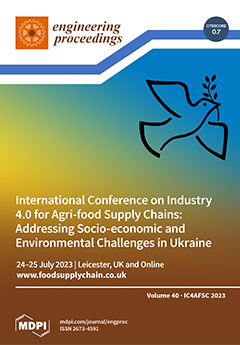Nowadays, the agri-food sector is facing fundamental challenges. According to the FAO study, the amount of arable land per capita in the world will decrease from 0.6 hectares per person in 2000 to 0.2 hectares by 2050, while the demand for food will increase by 70%. With today’s yield growth of 1.5% per year, such changes could result in global food shortages. Therefore, the governments of developed and developing countries should support initiatives for the digitization of agri-food businesses and the introduction of new technologies to increase the volume of food production. Russia’s war against Ukraine is the main cause of the global food crisis, which could bring serious political and economic consequences. The agricultural and food sector of Ukraine is about 10% of GDP. For many years, the Ukrainian agro-industrial complex, before the full-scale invasion of Russia, occupied a leading position among the global exporters. Ukraine supplied 10% of world wheat exports, more than 14% of corn and more than 47% of sunflower oil. A full-scale war has become a real test for the Ukrainian agri-food industry. The invasion entailed the destruction of food production processes and logistics chains. Many sowing areas were mined, equipment and warehouses were destroyed. At the end of 2022, Ukraine exported agricultural products worth USD 23.6 billion. Although the figure for 2022 is 15% less than the record of 2021 (USD 27.9 billion), last year’s value of exports became the second since the independence of Ukraine. Disruptions to Ukrainian exports exacerbated the rise in food prices, which, according to the FAO index, increased by 54% in February 2022. In March 2023, prices fell, but they were still 6.4% higher than in 2022. The purpose of the study is to assess the level of digital transformation of the Ukrainian agri-food industry in order to ensure food security at the national and international levels. Digitalization of the agri-food industry in Ukraine should be considered a source of deep systemic transformations, which involves the use of digital technologies at the business level to optimize business operations, increase company productivity, and improve interaction with suppliers and customers. For agri-food companies, the issue of digitalization concerns not only technological modernization, but also a complete change of business processes: farm management systems, data processing and harvest forecasting, agricultural processing, food quality management, systems for creating added value for products, warehouse management systems, and human resources management. Nowadays, digitalization can accelerate the transformation of the agri-food industry across the entire supply chain, from manufacturing and purchasing processes to distribution, logistics and finance. Innovative technologies that can become breakthrough in the agri-food industry are as follows: bioinformatics; synthetic biology; food design; smart farming; vertical farms; aquaculture; bioinformatics; genetics; alternative sources of protein; technology of conservation and extension of the shelf life of food products. In Ukraine, a number of agri-food enterprises are moving to Industry 4.0. The most innovative companies in Ukraine are the largest exporters “Kernel”, “MHP”, “ASTARTA-KYIV”. “Kernel”, a large producer and exporter of sunflower oil, has been successfully implementing innovations for the agro-industrial complex of Ukraine for many years. The company uses digital technologies at all stages—from growing products to sales. The company’s IT team digitized logistics, trading, and document management. All information about the processes taking place in agri-food production is collected in the “Kernel DigitalAgriBusiness” innovative ecosystem. “MHP”, the largest producer and exporter of chicken in Ukraine, continues to use biogas to produce electricity, industrial steam, and heating. “MHP” biogas projects are a significant contribution to the company’s energy independence and environmental responsibility. “ASTARTA-KYIV”, a vertically integrated agricultural holding, developed a complex system of IT solutions for agribusiness management “AgriChain”, which includes management of the land bank of the agricultural company (AgriChain Land), agricultural production (AgriChain Farm), monitoring of crops (AgriChain Scout), logistics of goods (AgriChain Logistics), warehouse management (AgriChain Barn), business processes (AgriChain Kit). Digital transformations are also being followed in the dairy industry. “Bel Shostka Ukraine” company is engaged in the digital transformation of the milk harvesting process. According to our research, breakthrough innovations are predominantly implemented by large Ukrainian agri-food companies, since they have significant financial resources for R&D, while SMEs are concentrating their efforts on the digitalization of business operations and implementation of energy efficient technologies.
Full article




